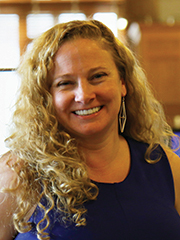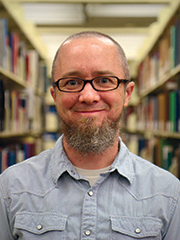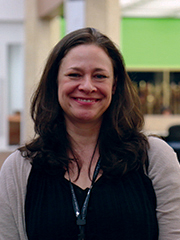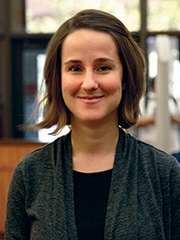A year ago, Rachel E. Winston joined the staff of the Benson Latin American Collection, taking on an entirely new post with the library as its Black Diaspora Archivist. The position is still one of few of its kind in the world, representing heightened attention in academia on diversity area studies, and a desire to collect the cultural history of an underserved population.
As African & African American Studies has joined the predominant fields at the university, the need for bibliographer support from the Libraries became increasingly clear. Winston’s work will involve enhancing existing resources at the Benson related to the African Diaspora in Latin America and the Caribbean, but will also push her to work with campus faculty and researchers to develop new collections in support of scholarly currents.
“I think in our present moment, black scholarship and the term ‘Black Diaspora’ has gained a lot of prominence mainly because we’ve reached a point where it can’t be ignored anymore,” says Winston. “So, the presence of black people, the contributions of black people, the impact of black people and black labor in societies worldwide has been there, has happened, but has been erased, has been ignored, has been forgotten and has been left out — intentionally and unintentionally — and so I think we’ve reached a point where the silence has become loud. People see the gaps and see the voids and there’s been more of a concerted effort to address that and to fill it.”
Winston’s initial focus has been on the work of processing a large set of materials given to the university by Dr. Edmund W. Gordon and Dr. Susan Gordon, which arrived at the university around the same time she joined the Libraries. “Black intellectuals are underrepresented in archives. This project says that we value the contributions of Black intellectuals, professionals, and artists, and that we will promote their use. I can’t think of a better fit for our first Black diaspora collection.”
Through almost a century of collecting in Latin American, the Benson naturally amassed materials related to the Black Diaspora, but Winston’s presence will allow for the development of a more cohesive approach to building upon those existing resources and the research that has already sprung from them.
“I think as time goes on, we’ll begin to see Black Studies integrated much more throughout different disciplines. Black Studies itself will continue to be necessary. There’s such important work that’s being done. But I do think that the black presence throughout different disciplines will become more recognized and more commonplace. We’ll be able to really take the conversation further in a lot of places. It will be accepted, and we can go from there.”
Winston isn’t taking the work for granted. Taking on a nascent area of study that has been historically marginalized presents challenges in a variety of areas, including the development of a collections strategy, targeting and locating relevant materials and finding the financial support to build an archive.
The Black Diaspora archive recently received a boost in the form of an endowment provided by civic-minded Austinites Darrick and Chiquita Eugene. Their support will aid Winston at a time when budgets might not favor new initiatives, but she feels the significance of the task ahead of her.
“It’s hard work. It’s important work. But I foresee that the impact of black people and the contributions of black people will be much better known.”







